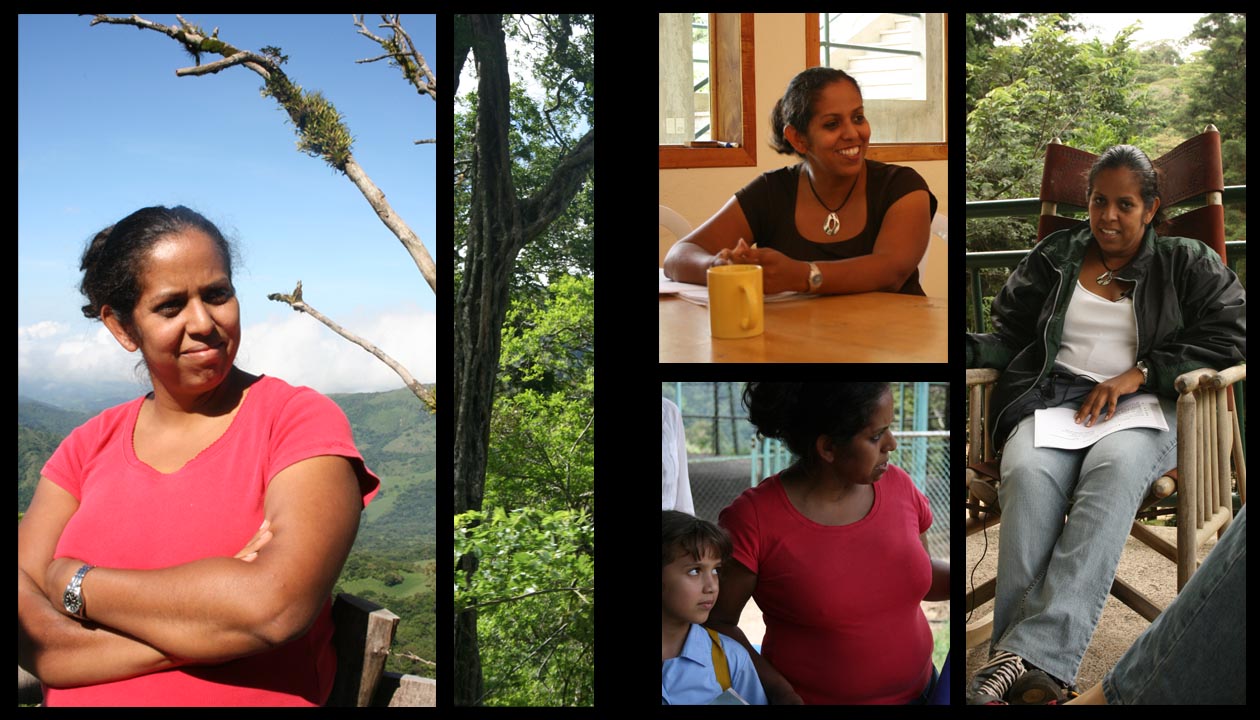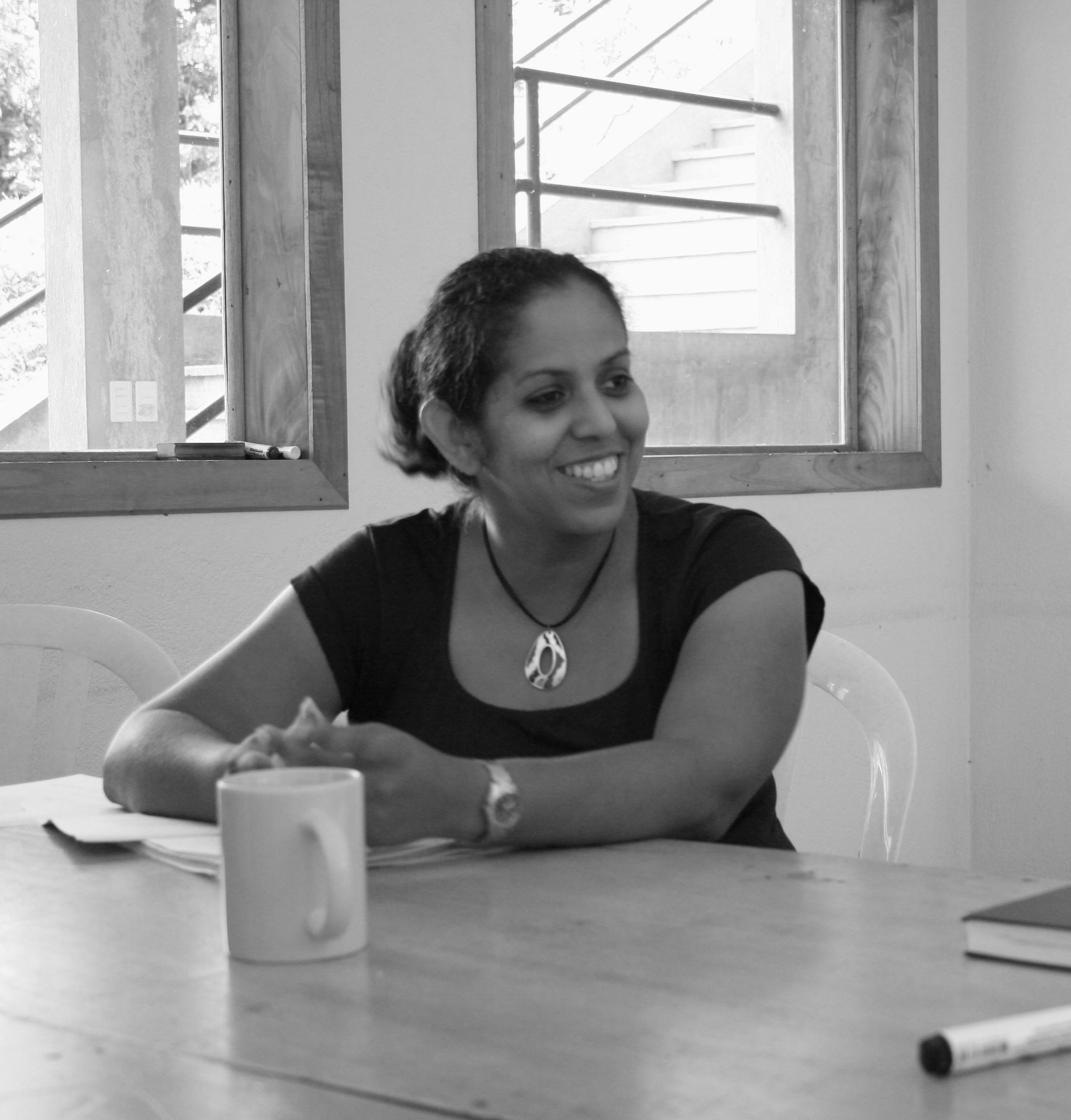Jenny Peña

Written by Lindsay A. Glick
Memories from the Past, A Community for the Future
Watching her interactions with the members of the Monteverde community, one would assume Jenny Peña developed these relationships over the course of a lifetime. It is only after hearing her story, however, that one can understand how Peña came to her work in Monteverde.
Telling her story from the airy deck that runs the length of the Monteverde Institute, she seems completely comfortable in this vast green paradise that she now calls home. Peña explains that her parents were community leaders in Liberia, the small, friendly barrio in which she grew up. She fondly recalls the calm and friendly environment where everyone knew each other.
Peña explains, with an evident sense of pride, that her mother was a strong woman that loved to help people. “For me she was awesome,” Peña says with a smile that conveys just how much of an influence her mother had on her. “The best example I had in my life.” Married at fifteen, her mother gave birth to her first child a year later and went on to have six more children, ultimately raising six girls and one boy. She laughs as she recalls that there was no person that her mother couldn’t make time to help. She would work on local water issues as well as make sure there were tables in the cafeteria at the local school. She traveled to San Jose with people from the community when they needed help or were worried about their travels. “She broke the role. Totally,” Peña explains, still seeming a bit in awe of all her mother’s actions.
 Due to an illness that weakened her body, Peña spent a great deal of time with her mother growing up, ultimately claiming her own independence in her request to attend school. During this time Peña was able to witness her strong mother in action, working with the community and taking the bus on the bumpy ride back and forth from San José. It was by her mother’s side, selling Coca Cola’s and cooking gallitos and tamales in their mobile restaurant, that Peña began to save up money for her education. Despite the long hours, often ten in the morning until two the next morning, she understood the importance of this work, receiving her salary at the end of each shift from her mother.
Due to an illness that weakened her body, Peña spent a great deal of time with her mother growing up, ultimately claiming her own independence in her request to attend school. During this time Peña was able to witness her strong mother in action, working with the community and taking the bus on the bumpy ride back and forth from San José. It was by her mother’s side, selling Coca Cola’s and cooking gallitos and tamales in their mobile restaurant, that Peña began to save up money for her education. Despite the long hours, often ten in the morning until two the next morning, she understood the importance of this work, receiving her salary at the end of each shift from her mother.
It was also during this time that her older sister became pregnant, only to be denied by her boyfriend. Peña’s father was outraged and threatened to throw his daughter out of the house, but it was at this moment that her mother took what perhaps could have been her biggest stand as she told her husband that he could leave if he chose to, but her daughter would stay.
It was her mother’s strong sense of independence and confidence that allowed for the changing of stereotypical family roles. Peña specifically remembers the vivid image of her father cooking his own breakfast after her mother refused to do it anymore. She credits having witnessed these changes in her family as the reason she came to her current work with the women of the Monteverde community.
Peña studied in San José for five years and ultimately found a job as a research assistant with a feminist group. Though she stayed for three years, she recalls the competition and rivalry between the women that ultimately drove her to leave. It was, however, a perfectly timed exit, for she soon discovered an advertisement for a position at the Monteverde Institute, where she continues to work today.
 Perhaps Peña’s connections with the community are so strong due to the nature of the work she does. Initially, she worked with a group raising awareness about domestic violence and helped to organize similar groups in the small, surrounding communities that are often ill-equipped to deal with such scenarios. She has traveled the bumpy, unpaved roads of this area countless times in her effort to form a network within the community that can serve as a resource to women in abusive relationships. She has helped establish support groups to provide women with a space in which they can begin to claim their own power and independence, just as she was able to do at an early age.
Perhaps Peña’s connections with the community are so strong due to the nature of the work she does. Initially, she worked with a group raising awareness about domestic violence and helped to organize similar groups in the small, surrounding communities that are often ill-equipped to deal with such scenarios. She has traveled the bumpy, unpaved roads of this area countless times in her effort to form a network within the community that can serve as a resource to women in abusive relationships. She has helped establish support groups to provide women with a space in which they can begin to claim their own power and independence, just as she was able to do at an early age.
Peña understands the responsibility each member has in such a group of people, and that it is important to respect the women within the community and their decisions. “It doesn’t matter that it’s a wrong decision,” she says about women that are not yet ready or capable of leaving abusive situations. While her easy laugh and endless compassion may help her form relationships with these women, it is her sensitivity and respect that has undoubtedly given many of them the strength to leave abusive situations. Peña is laying a foundation within the community that will provide future generations the resources and support necessary to continue the fight against domestic violence.